Fleurs du Mal Magazine


Or see the index

The Titanic
Out of the misty North
A stealthy foeman stole;
Far from the haunted Pole
On the wide sea went he forth,
And he met a giant ship
As he scoured the sea for toll
It cannot reach its goal
Crushed in his icy grip.
“Of every four just three”
This was his deadly dole.
Unseen he called the roll
Ah! a cold grave is the Sea.
Yet the Sea is not the end,
And Life is not the whole.
Over each heroic soul
Shall Eternity extend.
Helen Leah Reed
(1864–1926)
The Titanic
(Poem)
• fleursdumal.nl magazine
More in: #More Poetry Archives, Archive Q-R, Archive Q-R
Here, the bodies of indigenous, Latinx, black and brown women are simultaneously the body politic and the body ecstatic, and portrayed with a glowing intimacy: the alphabet of a hand in the dark, the hips’ silvered percussion, a thigh’s red-gold geometry, the emerald tigers that leap in a throat.
 Natalie Diaz was born and raised in the Fort Mojave Indian Village in Needles, California, on the banks of the Colorado River. She is Mojave and an enrolled member of the Gila River Indian Tribe.
Natalie Diaz was born and raised in the Fort Mojave Indian Village in Needles, California, on the banks of the Colorado River. She is Mojave and an enrolled member of the Gila River Indian Tribe.
Her first poetry collection, When My Brother Was an Aztec, won an American Book Award. She is a 2018 MacArthur Fellow, as well as a Lannan Literary Fellow and a Native Arts and Cultures Foundation Artist Fellow.
She was awarded the Holmes National Poetry Prize and a Hodder Fellowship from Princeton University. She is a member of the Board of Trustees for the United States Artists, where she is an alumna of the Ford Fellowship. Diaz is the Maxine and Jonathan Marshall Chair in Modern and Contemporary Poetry at Arizona State University.
Postcolonial Love Poem
Natalie Diaz
Paperback
128 pages
Publisher: Faber & Faber
Published: 16/07/2020
Language: English
ISBN-10: 0571359868
ISBN-13: 978-0571359868
£10.99
# new poetry
Postcolonial Love Poem
by Natalie Diaz
• fleursdumal.nl magazine
More in: #Archive Native American Library, #Editors Choice Archiv, - Book News, Archive C-D, Archive C-D
Today, on Wednesday 26 August, The Discomfort of Evening, written by Marieke Lucas Rijneveld and translated from Dutch by Michele Hutchison, is announced as the winner of The 2020 International Booker Prize.
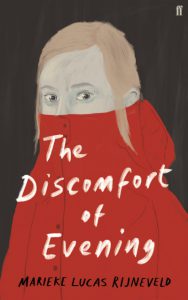 The £50,000 prize will be split between Marieke Lucas Rijneveld and Michele Hutchison, giving both the author and translator equal recognition.
The £50,000 prize will be split between Marieke Lucas Rijneveld and Michele Hutchison, giving both the author and translator equal recognition.
The winner was announced by chair of the judges, Ted Hodgkinson, this evening, at a digital event which was livestreamed across The Booker Prizes Facebook and YouTube pages. The Dutch edition was a bestseller in the Netherlands, where it won the prestigious ANV Debut Prize.
The Discomfort of Evening was chosen from a shortlist of six books during a lengthy and rigorous judging process, by a panel of five judges, chaired by Ted Hodgkinson, Head of Literature and Spoken Word at Southbank Centre. The panel also includes: Lucie Campos, director of the Villa Gillet, France’s centre for international writing; Man Booker International Prize-winning translator and writer Jennifer Croft; Booker Prize longlisted author Valeria Luiselli and writer, poet and musician Jeet Thayil, whose novel Narcopolis was shortlisted for the Man Booker Prize in 2012.
Chair of the judges, Ted Hodgkinson says: ‘We set ourselves an immense task in selecting a winner from our superb shortlist, filled with fiction bold enough to upend mythic foundations and burst the banks of the novel itself. From this exceptional field, and against an extraordinary backdrop, we were looking for a book that goes beyond echoing our dystopian present and possesses a timeless charge. Combining a disarming new sensibility with a translation of singular sensitivity, The Discomfort of Evening is a tender and visceral evocation of a childhood caught between shame and salvation, and a deeply deserving winner of The 2020 International Booker Prize.’
Born in April 1991 in Nieuwendijk, Netherlands, Marieke Lucas Rijneveld, whose preferred pronouns are they/them, is the youngest author to win The International Booker Prize. The Dutch author grew up in a Reformed farming family in North Brabant before moving to Utrecht and, alongside their writing career, Rijneveld still works on a dairy farm. One of the most exciting new voices in Dutch literature, Rijneveld has already won awards for both their first poetry collection Calfskin and their debut novel The Discomfort of Evening.
Following a stint as an editor, Michele Hutchison became a literary translator from Dutch. Her translations include the bestselling An American Princess by Annejet van der Zijl, Mona in Three Acts by Griet op de Beeck and Seaweed by Miek Zwamborn. She is also co-author of The Happiest Kids in the World.
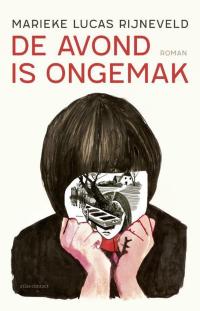 The Discomfort of Evening tells the story of Jas and her devout farming family in a strict Christian community in rural Netherlands. One winter’s day, her older brother joins an ice skating trip. Resentful at being left alone, she attempts to bargain with God pitting the life of her pet rabbit against that of her brother; he never returns. As grief overwhelms the farm, Jas succumbs to a vortex of increasingly disturbing fantasies, watching her family disintegrate into a darkness that threatens to derail them all.
The Discomfort of Evening tells the story of Jas and her devout farming family in a strict Christian community in rural Netherlands. One winter’s day, her older brother joins an ice skating trip. Resentful at being left alone, she attempts to bargain with God pitting the life of her pet rabbit against that of her brother; he never returns. As grief overwhelms the farm, Jas succumbs to a vortex of increasingly disturbing fantasies, watching her family disintegrate into a darkness that threatens to derail them all.
The Guardian described The Discomfort of Evening as ‘an unflinching study of a family falling apart in the madness of grief, rendered all the more unnerving for the childishly plain, undramatic way their compulsive behaviours are reported’.
The Financial Times said ‘there is a bold beauty to the book… by using Jas’s everyday world as a metaphor for loneliness and fear, Rijneveld has created something exceptional.’
Megan Nolan for the New Statesman commented that the character of Jas ‘produces a truly haunting and savage loneliness, communicated by Rijneveld with an agile intensity I have rarely encountered.’
The International Booker Prize is awarded every year for a single book that is translated into English and published in the UK or Ireland. It aims to encourage more publishing and reading of quality fiction from all over the world and to promote the work of translators. Both novels and short-story collections are eligible. The contribution of both author and translator is given equal recognition, with the £50,000 prize split between them.
This year the judges considered 124 books, translated from 30 languages.
(Together, the two Booker Prizes reward the best fiction from around the globe that is published in English in the UK and Ireland. The Booker Prizes are sponsored by Crankstart, a charitable foundation.)
# More on website The Booker Prize

Selfportrait (Wikimedia)
Marieke Lucas Rijneveld
Dutch writer and poet (1991)
Novels
2018 – De avond is ongemak
2020 – Engels: The Discomfort of Evening, translation Michele Hutchison (Booker International Prize 2020)
Collections of poetry
2015 – Kalfsvlies (C. Buddingh’-prijs 2016) (Ida Gerhardt Poëzieprijs 2020)
2019 – Fantoommerrie
• fleursdumal.nl magazine
More in: - Book News, Archive Q-R, Archive Q-R, AUDIO, CINEMA, RADIO & TV, Awards & Prizes, Marieke Lucas Rijneveld, Rijneveld, Marieke Lucas

Automne Malade
Automne malade et adoré
Tu mourras quand l’ouragan soufflera dans les roseraies
Quand il aura neigé
Dans les vergers
Pauvre automne
Meurs en blancheur et en richesse
De neige et de fruits mûrs
Au fond du ciel
Des éperviers planent
Sur les nixes nicettes aux cheveux verts et naines
Qui n’ont jamais aimé
Aux lisières lointaines
Les cerfs ont bramé
Et que j’aime ô saison que j’aime tes rumeurs
Les fruits tombant sans qu’on les cueille
Le vent et la forêt qui pleurent
Toutes leurs larmes en automne feuille à feuille
Les feuilles
Qu’on foule
Un train
Qui roule
La vie
S’écoule
Guillaume Apollinaire
(1880 – 1918)
Automne Malade
(Alcools – 1913)
• fleursdumal.nl magazine
More in: Apollinaire, Guillaume, Archive A-B, Archive A-B, Guillaume Apollinaire
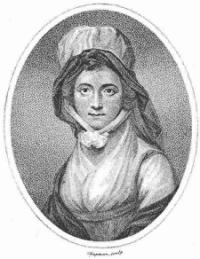
Sonnet XXVI
O partial MEMORY! Years, that fled too fast,
From thee in more than pristine beauty rise,
Forgotten all the transient tears and sighs
Somewhat that dimm’d their brightness! Thou hast chas’d
Each hovering mist from the soft Suns, that grac’d
Our fresh, gay morn of Youth; – the Heart’s high prize,
Friendship, – and all that charm’d us in the eyes
Of yet unutter’d Love. – So pleasures past,
That in thy crystal prism thus glow sublime,
Beam on the gloom’d and disappointed Mind
When Youth and Health, in the chill’d grasp of Time,
Shudder and fade; – and cypress buds we find
Ordain’d Life’s blighted roses to supply,
While but reflected shine the golden lights of Joy.
Anna Seward
(1742-1809)
Sonnet XXVI
(O partial MEMORY!)
• fleursdumal.nl magazine
More in: #Editors Choice Archiv, Archive S-T, Archive S-T
Weird Westerns is an exploration of the hybrid western genre—an increasingly popular and visible form that mixes western themes, iconography, settings, and conventions with elements drawn from other genres, such as science fiction, horror, and fantasy.
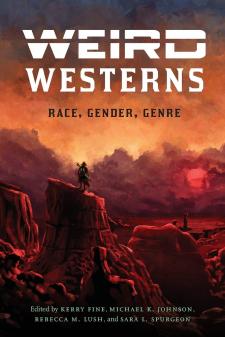 Despite frequent declarations of the western’s death, the genre is now defined in part by its zombie-like ability to survive in American popular culture in weird, reanimated, and reassembled forms.
Despite frequent declarations of the western’s death, the genre is now defined in part by its zombie-like ability to survive in American popular culture in weird, reanimated, and reassembled forms.
The essays in Weird Westerns analyze a wide range of texts, including those by Native American authors Stephen Graham Jones (Blackfeet) and William Sanders (Cherokee); the cult television series Firefly and The Walking Dead; the mainstream feature films Suicide Squad and Django Unchained; the avant-garde and bizarre fiction of Joe R. Lansdale; the tabletop roleplaying game Deadlands: The Weird West; and the comic book series Wynonna Earp.
The essays explore how these weird westerns challenge conventional representations by destabilizing or subverting the centrality of the heterosexual, white, male hero but also often surprisingly reinforce existing paradigms in their inability to imagine an existence outside of colonial frameworks.
Author Bio:
Kerry Fine is an instructor in the Department of English at Arizona State University. Michael K. Johnson is a professor of English at the University of Maine–Farmington. Rebecca M. Lush is an associate professor at California State University, San Marcos. Sara L. Spurgeon is a professor of American literature at Texas Tech University.
Postwestern Horizons:
Postwestern Horizons encourages scholarship which rethinks and reimagines traditional western scholarship by challenging predominant paradigms, including revisionist ones, and dislocating our sense of region. By moving past the West as a national place, process, and idea to more methodologically innovative, transnationally daring, and theoretically fertile horizons of scholarship, this series encourages new ways of conceiving cultural production and reception. Postwestern Horizons encompasses studies of visual culture, environmental studies, literature, history, film studies, and much more.
Weird Westerns
Race, Gender, Genre
Edited by Kerry Fine, Michael K. Johnson, Rebecca M. Lush, and Sara L. Spurgeon
Postwestern Horizons Series
468 pages
Index
Paperback
August 2020
978-1-4962-2178-0
$35.00
Hardcover
August 2020
978-1-4962-2116-2
$70.00
# new books
Weird Westerns.
Race, Gender, Genre
• fleursdumal.nl magazine
More in: - Book News, - Bookstores, Art & Literature News, AUDIO, CINEMA, RADIO & TV, NONFICTION: ESSAYS & STORIES, Western Non-Fiction
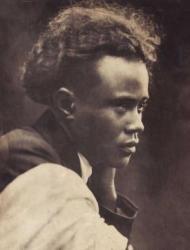
Le vent
Force la grotte où marche le vent,
source du parfum de l’aurore
qu’il verse au seuil vespéral,
et de la jeunesse des futaies lointaines
qu’il cache dans la tendresse des herbes,
et de la splendeur du soleil moribond
qu’il ressuscite sur les collines prolongées.
Vois-le en songe quand il commence à poindre
et s’apprête à se ramifier comme une liane vivante ;
attends sur les rives des visions :
à peine éclos, il apprend à voler
puis déploie ses ailes comme un oiseau sauvage
et vient s’égarer dans les vergers
où il saccage fleurs et fruits.
Quelle liane, et d’où surgie ?
La voici qui enlace tous les arbres :
depuis les jamrosas parfumés,
qui forment un buisson dans l’Est,
jusqu’à la voûte des bougainvillées
et l’élan des dragonniers qui ondulent
sur les terrasses d’Iarive ;
depuis les mille cœurs des rosiers
qui s’offrent au sommet des tiges vertes,
et les gargoulettes des lys qui ne se s’ouvrent pas
pour pouvoir recueillir la rosée des crépuscules,
jusqu’à ces autres plantes sans nombre
dont on ignore encore le vrai nom
et que seuls vous connaissez, ô mes songes.
Oui, jusqu’à ces cheveux qui tremblotent
aux tempes de la vieille femme :
dernières fleurs de ses jours perdus
qui mendient un baiser au bord de la tombe –
et jusqu’au lambe que la femme-enfant
laisse traîner un peu en souriant
et qu’elle agite dans le brouillard !
– Et cet oiseau que tu ne vois pas
mais qui te frappe le front
et qui picore dans tes épaules
et griffe jusqu’à ta nuque :
quel oiseau est-il, l’oiseau du vent,
cet oiseau ivre qui titube
comme une roussette aux ailes déchirées ?
– Légendes et légendes, fables et fables…
Innombrables sont les légendes
qui peuvent forcer la grotte
où a poussé cette liane vivante
qui vient enlacer tous les arbres ;
innombrables, les fables qui entourent
l’éclosion de cet oiseau immatériel
qui tombe puis reprend son vol ;
mais il en est deux autres qui
me paraissent neuves
et que je n’ai connues que ces jours-ci :
tournoyait derrière ma porte
le vent humide de l’hiver,
tournoyait comme nos enfants
qui se cherchent et se cachent
quand s’illumine l’automne ;
tournoyait avec violence
comme un sanglier poursuivi,
ou un bœuf sauvage :
– D’où peut-il venir si ce n’est
des forêts ou du désert ?
disais-je. Puis,
lointaine et presque inaudible,
plus rien qu’une rumeur comme
en cèlent les coquillages :
– Il vient de l’océan, disais-je, le vent…
Jean-Joseph Rabearivelo
(1901? 1903? – 1937)
Le vent (poème)
• fleursdumal.nl magazine
More in: Archive Q-R, Archive Q-R, Jean-Joseph Rabearivelo
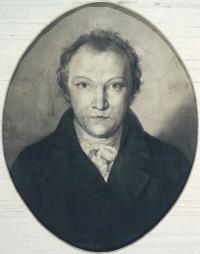
To The Muses
Whether on Ida’s shady brow,
Or in the chambers of the East,
The chambers of the sun, that now
From ancient melody have ceas’d;
Whether in Heav’n ye wander fair,
Or the green corners of the earth,
Or the blue regions of the air,
Where the melodious winds have birth;
Whether on crystal rocks ye rove,
Beneath the bosom of the sea
Wand’ring in many a coral grove,
Fair Nine, forsaking Poetry!
How have you left the ancient love
That bards of old enjoy’d in you!
The languid strings do scarcely move!
The sound is forc’d, the notes are few!
William Blake
(1757 – 1827)
To The Muses
• fleursdumal.nl magazine
More in: Archive A-B, Archive A-B, Blake, William, Tales of Mystery & Imagination
Shortlisted for the International Booker Prize 2020, an enthralling Orwellian novel about the terrors of state surveillance from one of Japan’s greatest writers.
 Finalist for the International Booker Prize and the National Book Award.
Finalist for the International Booker Prize and the National Book Award.
A haunting Orwellian novel about the terrors of state surveillance, from the acclaimed author of The Housekeeper and the Professor.
On an unnamed island, objects are disappearing: first hats, then ribbons, birds, roses. . . . Most of the inhabitants are oblivious to these changes, while those few able to recall the lost objects live in fear of the draconian Memory Police, who are committed to ensuring that what has disappeared remains forgotten.
When a young writer discovers that her editor is in danger, she concocts a plan to hide him beneath her floorboards, and together they cling to her writing as the last way of preserving the past.
A surreal, provocative fable about the power of memory and the trauma of loss, The Memory Police is a stunning new work from one of the most exciting contemporary authors writing in any language.
Yoko Ogawa has won every major Japanese literary award. Her fiction has appeared in The New Yorker, A Public Space, and Zoetrope: All-Story. Her works include The Diving Pool, a collection of three novellas; The Housekeeper and the Professor; Hotel Iris; and Revenge. She lives in Hyogo.
The Memory Police
Yoko Ogawa
Published by Pantheon
Aug 13, 2019
ISBN 9781101870600
Hardcover
$25.95
Published by Vintage
Jul 28, 2020
ISBN 9781101911815
Paperback
$16.00
# new novel
The Memory Police
by Yoko Ogawa
• fleursdumal.nl magazine
More in: - Book News, - Bookstores, Archive O-P
• Vol trots kondigt West Den Haag ‘Tote Räume’ aan, de eerste solo-expositie van Gregor Schneider in Nederland.
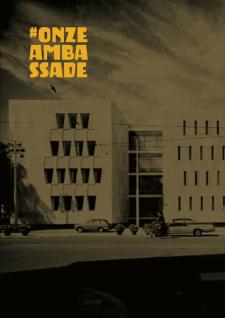 Het werk van Schneider wordt gezien als baanbrekend; en zou als profetisch kunnen worden gezien, in deze tijd waarin het bewaren van afstand verplicht is. Het werk is gebaseerd op mechanismen van fysieke isolatie. De tentoonstelling toont een aaneenschakeling van kamers, beeldhouwwerken, menselijke figuren, foto’s en video’s die vier decennia van radicale kunst bijeen brengt; en is een wisselwerking met de oorspronkelijke functie van het gebouw: de Ambassade van de Verenigde Staten in Nederland van 1959 tot 2018.
Het werk van Schneider wordt gezien als baanbrekend; en zou als profetisch kunnen worden gezien, in deze tijd waarin het bewaren van afstand verplicht is. Het werk is gebaseerd op mechanismen van fysieke isolatie. De tentoonstelling toont een aaneenschakeling van kamers, beeldhouwwerken, menselijke figuren, foto’s en video’s die vier decennia van radicale kunst bijeen brengt; en is een wisselwerking met de oorspronkelijke functie van het gebouw: de Ambassade van de Verenigde Staten in Nederland van 1959 tot 2018.
Een duidelijk voorbeeld van de uitwisseling is de ‘Interrogation Room’ – een ruimte die een kopie is van een van de gevangeniscellen in het detentiekamp Guantánamo Bay, het Amerikaanse detentiecentrum in het zuidoosten van Cuba. Opgenomen in de setting van West Den Haag, overschrijdt ‘Interrogation Room’ de grenzen van de esthetica en krijgt het de status van een echte autoritaire ruimte. Waarmee de macht over de bezoekers en de potentiële schending van hun soevereiniteit wordt geschetst.
In de sequentie is ook het werk ‘Cold Storage Cell’ opgenomen; een ruimte waarmee Schneider, een politieke context schetst. Een thema dat zich, met tussenpozen, in al zijn werk herhaalt. Met de opstelling van ‘Cryo-Tank Phoenix 3’ gaat Schneiders opvatting over afgesloten ruimtes verder dan het geboden politieke kader en krijgt een metafysisch karakter. Iedere plek waar de tank verrijst, wordt getransformeerd tot een tussenzone tussen leven en dood, tussen deze wereld en de wereld die zal komen.
In de expositie is een aparte deel gewijd aan ‘Geburtshaus Goebbels’, het huis in Mönchengladbach-Rheydt waar Joseph Goebbels— de Rijksminister van Propaganda in Nazi-Duitsland — werd geboren.
In ‘Geburtshaus Goebbels’ traceert Schneider bijna letterlijk de wortels van de nazigeschiedenis en worden de fysieke fundamenten van Goebbels geboorteplaats blootgelegd —de oorsprong van zijn afkomst. Binnen het universum van Schneider is ‘Geburtshaus Goebbels’ ook een opvolger van ‘Haus u r’, het ouderlijk huis van de kunstenaar, dat op steenworp afstand van het geboortehuis van Goebbels staat.
 ‘Haus u r’ is het verlaten pand waar hij van 1985 tot 2001 werkte en onophoudelijk de innerlijke structuur reconstrueerde als een eigenzinnige typologie van viscerale kamers die in de bestaande kamers waren gebouwd (met ramen voor de ramen, muren voor de muren, etc.).
‘Haus u r’ is het verlaten pand waar hij van 1985 tot 2001 werkte en onophoudelijk de innerlijke structuur reconstrueerde als een eigenzinnige typologie van viscerale kamers die in de bestaande kamers waren gebouwd (met ramen voor de ramen, muren voor de muren, etc.).
Door het proces van zelf verslindende duplicatie – waarbij elke kamer ook de verborgen kamer is, en de ruimte – het verschil – tussen de kamers, wordt ‘Haus u r’ een ervaring van tegenstrijdigheden, waarbij aanwezigheid en afwezigheid, constructie en eliminatie, niet van elkaar gescheiden kunnen worden.
• In de context van de expositie worden enkele performances opgevoerd. En in aanvulling op het project ‘Tote Räume’ organiseert West in november van dit jaar een internationaal symposium, met de werktitel: ‘Gregor Schneider: Kunst im Kopf’.
• Gregor Schneider (Duitsland, 1969) wordt gezien als een van de meest invloedrijke kunstenaars van de afgelopen drie decennia. Sinds de jaren ‘90 heeft Schneider in toonaangevende musea over de hele wereld solotentoonstellingen gepresenteerd, waaronder, in Musée d’Art Moderne de Paris, Museum of Contemporary Art, Los Angeles, Kunstsammlung Nordrhein-Westfalen, Düsseldorf en Museo d’Arte Contemporena Roma. In 2001 won Schneider de Golden Lion op de Biënnale van Venetië, en sindsdien is zijn werk wereldwijd het onderwerp van discussies en controverses. Schneiders werk is een combinatie van architectuur, beeldhouwwerk en performance en becommentarieert de (historische) werkelijkheid.
Dit project wordt mede mogelijk gemaakt door het Ministerie van OCW, de Gemeente Den Haag, het Mondriaan Fonds en het Goethe-Institut.
Gregor Schneider
Tote Räume
Exhibition: 29.08.2020 — 06.12.2020
Opening: 29.08.2020, 19:00
Location: West Museumkwartier, vml. Amerikaanse ambassade, Lange Voorhout 102, Den Haag
West Den Haag Lange Voorhout 102, 2514 EJ Den Haag, +31(0)70.3925359, www.westdenhaag.nl
• fleursdumal.nl magazine
More in: Architecture, Archive S-T, Exhibition Archive, Galerie Deutschland, Gregor Schneider
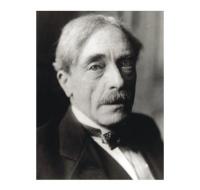
Hélène
Azur ! c’est moi… Je viens des grottes de la mort
Entendre l’onde se rompre aux degrés sonores,
Et je revois les galères dans les aurores
Ressusciter de l’ombre au fil des rames d’or.
Mes solitaires mains appellent les monarques
Dont la barbe de sel amusait mes doigts purs ;
Je pleurais. Ils chantaient leurs triomphes obscurs
Et les golfes enfuis aux poupes de leurs barques.
J’entends les conques profondes et les clairons
Militaires rythmer le vol des avirons ;
Le chant clair des rameurs enchaîne le tumulte,
Et les Dieux, à la proue héroïque exaltés
Dans leur sourire antique et que l’écume insulte,
Tendent vers moi leurs bras indulgents et sculptés.
Paul Valéry
(1871-1945)
Hélène
Poème
• fleursdumal.nl magazine
More in: Archive U-V, Archive U-V, Valéry, Paul
Chickamauga
One sunny autumn afternoon a child strayed away from its rude home in a small field and entered a forest unobserved. It was happy in a new sense of freedom from control, happy in the opportunity of exploration and adventure; for this child’s spirit, in bodies of its ancestors, had for thousands of years been trained to memorable feats of discovery and conquest—victories in battles whose critical moments were centuries, whose victors’ camps were cities of hewn stone. From the cradle of its race it had conquered its way through two continents and passing a great sea had penetrated a third, there to be born to war and dominion as a heritage.
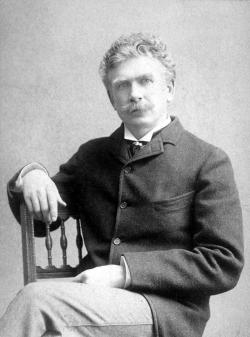 The child was a boy aged about six years, the son of a poor planter. In his younger manhood the father had been a soldier, had fought against naked savages and followed the flag of his country into the capital of a civilized race to the far South. In the peaceful life of a planter the warrior-fire survived; once kindled, it is never extinguished. The man loved military books and pictures and the boy had understood enough to make himself a wooden sword, though even the eye of his father would hardly have known it for what it was. This weapon he now bore bravely, as became the son of an heroic race, and pausing now and again in the sunny space of the forest assumed, with some exaggeration, the postures of aggression and defense that he had been taught by the engraver’s art. Made reckless by the ease with which he overcame invisible foes attempting to stay his advance, he committed the common enough military error of pushing the pursuit to a dangerous extreme, until he found himself upon the margin of a wide but shallow brook, whose rapid waters barred his direct advance against the flying foe that had crossed with illogical ease. But the intrepid victor was not to be baffled; the spirit of the race which had passed the great sea burned unconquerable in that small breast and would not be denied. Finding a place where some bowlders in the bed of the stream lay but a step or a leap apart, he made his way across and fell again upon the rear-guard of his imaginary foe, putting all to the sword.
The child was a boy aged about six years, the son of a poor planter. In his younger manhood the father had been a soldier, had fought against naked savages and followed the flag of his country into the capital of a civilized race to the far South. In the peaceful life of a planter the warrior-fire survived; once kindled, it is never extinguished. The man loved military books and pictures and the boy had understood enough to make himself a wooden sword, though even the eye of his father would hardly have known it for what it was. This weapon he now bore bravely, as became the son of an heroic race, and pausing now and again in the sunny space of the forest assumed, with some exaggeration, the postures of aggression and defense that he had been taught by the engraver’s art. Made reckless by the ease with which he overcame invisible foes attempting to stay his advance, he committed the common enough military error of pushing the pursuit to a dangerous extreme, until he found himself upon the margin of a wide but shallow brook, whose rapid waters barred his direct advance against the flying foe that had crossed with illogical ease. But the intrepid victor was not to be baffled; the spirit of the race which had passed the great sea burned unconquerable in that small breast and would not be denied. Finding a place where some bowlders in the bed of the stream lay but a step or a leap apart, he made his way across and fell again upon the rear-guard of his imaginary foe, putting all to the sword.
Now that the battle had been won, prudence required that he withdraw to his base of operations. Alas; like many a mightier conqueror, and like one, the mightiest, he could not
curb the lust for war,
Nor learn that tempted Fate will leave the loftiest star.
Advancing from the bank of the creek he suddenly found himself confronted with a new and more formidable enemy: in the path that he was following, sat, bolt upright, with ears erect and paws suspended before it, a rabbit! With a startled cry the child turned and fled, he knew not in what direction, calling with inarticulate cries for his mother, weeping, stumbling, his tender skin cruelly torn by brambles, his little heart beating hard with terror—breathless, blind with tears—lost in the forest! Then, for more than an hour, he wandered with erring feet through the tangled undergrowth, till at last, overcome by fatigue, he lay down in a narrow space between two rocks, within a few yards of the stream and still grasping his toy sword, no longer a weapon but a companion, sobbed himself to sleep. The wood birds sang merrily above his head; the squirrels, whisking their bravery of tail, ran barking from tree to tree, unconscious of the pity of it, and somewhere far away was a strange, muffed thunder, as if the partridges were drumming in celebration of nature’s victory over the son of her immemorial enslavers. And back at the little plantation, where white men and black were hastily searching the fields and hedges in alarm, a mother’s heart was breaking for her missing child.
Hours passed, and then the little sleeper rose to his feet. The chill of the evening was in his limbs, the fear of the gloom in his heart. But he had rested, and he no longer wept. With some blind instinct which impelled to action he struggled through the undergrowth about him and came to a more open ground—on his right the brook, to the left a gentle acclivity studded with infrequent trees; over all, the gathering gloom of twilight. A thin, ghostly mist rose along the water. It frightened and repelled him; instead of recrossing, in the direction whence he had come, he turned his back upon it, and went forward toward the dark inclosing wood. Suddenly he saw before him a strange moving object which he took to be some large animal—a dog, a pig—he could not name it; perhaps it was a bear. He had seen pictures of bears, but knew of nothing to their discredit and had vaguely wished to meet one. But something in form or movement of this object—something in the awkwardness of its approach—told him that it was not a bear, and curiosity was stayed by fear. He stood still and as it came slowly on gained courage every moment, for he saw that at least it had not the long menacing ears of the rabbit. Possibly his impressionable mind was half conscious of something familiar in its shambling, awkward gait. Before it had approached near enough to resolve his doubts he saw that it was followed by another and another. To right and to left were many more; the whole open space about him were alive with them—all moving toward the brook.
They were men. They crept upon their hands and knees. They used their hands only, dragging their legs. They used their knees only, their arms hanging idle at their sides. They strove to rise to their feet, but fell prone in the attempt. They did nothing naturally, and nothing alike, save only to advance foot by foot in the same direction. Singly, in pairs and in little groups, they came on through the gloom, some halting now and again while others crept slowly past them, then resuming their movement. They came by dozens and by hundreds; as far on either hand as one could see in the deepening gloom they extended and the black wood behind them appeared to be inexhaustible. The very ground seemed in motion toward the creek. Occasionally one who had paused did not again go on, but lay motionless. He was dead. Some, pausing, made strange gestures with their hands, erected their arms and lowered them again, clasped their heads; spread their palms upward, as men are sometimes seen to do in public prayer.
Not all of this did the child note; it is what would have been noted by an elder observer; he saw little but that these were men, yet crept like babes. Being men, they were not terrible, though unfamiliarly clad. He moved among them freely, going from one to another and peering into their faces with childish curiosity. All their faces were singularly white and many were streaked and gouted with red. Something in this—something too, perhaps, in their grotesque attitudes and movements—reminded him of the painted clown whom he had seen last summer in the circus, and he laughed as he watched them. But on and ever on they crept, these maimed and bleeding men, as heedless as he of the dramatic contrast between his laughter and their own ghastly gravity. To him it was a merry spectacle. He had seen his father’s negroes creep upon their hands and knees for his amusement—had ridden them so, “making believe” they were his horses. He now approached one of these crawling figures from behind and with an agile movement mounted it astride. The man sank upon his breast, recovered, flung the small boy fiercely to the ground as an unbroken colt might have done, then turned upon him a face that lacked a lower jaw—from the upper teeth to the throat was a great red gap fringed with hanging shreds of flesh and splinters of bone. The unnatural prominence of nose, the absence of chin, the fierce eyes, gave this man the appearance of a great bird of prey crimsoned in throat and breast by the blood of its quarry. The man rose to his knees, the child to his feet. The man shook his fist at the child; the child, terrified at last, ran to a tree near by, got upon the farther side of it and took a more serious view of the situation. And so the clumsy multitude dragged itself slowly and painfully along in hideous pantomime—moved forward down the slope like a swarm of great black beetles, with never a sound of going—in silence profound, absolute.
Instead of darkening, the haunted landscape began to brighten. Through the belt of trees beyond the brook shone a strange red light, the trunks and branches of the trees making a black lacework against it. It struck the creeping figures and gave them monstrous shadows, which caricatured their movements on the lit grass. It fell upon their faces, touching their whiteness with a ruddy tinge, accentuating the stains with which so many of them were freaked and maculated. It sparkled on buttons and bits of metal in their clothing. Instinctively the child turned toward the growing splendor and moved down the slope with his horrible companions; in a few moments had passed the foremost of the throng—not much of a feat, considering his advantages. He placed himself in the lead, his wooden sword still in hand, and solemnly directed the march, conforming his pace to theirs and occasionally turning as if to see that his forces did not straggle. Surely such a leader never before had such a following.
Scattered about upon the ground now slowly narrowing by the encroachment of this awful march to water, were certain articles to which, in the leader’s mind, were coupled no significant associations: an occasional blanket tightly rolled lengthwise, doubled and the ends bound together with a string; a heavy knapsack here, and there a broken rifle—such things, in short, as are found in the rear of retreating troops, the “spoor” of men flying from their hunters. Everywhere near the creek, which here had a margin of lowland, the earth was trodden into mud by the feet of men and horses. An observer of better experience in the use of his eyes would have noticed that these footprints pointed in both directions; the ground had been twice passed over—in advance and in retreat. A few hours before, these desperate, stricken men, with their more fortunate and now distant comrades, had penetrated the forest in thousands. Their successive battalions, breaking into swarms and reforming in lines, had passed the child on every side—had almost trodden on him as he slept. The rustle and murmur of their march had not awakened him. Almost within a stone’s throw of where he lay they had fought a battle; but all unheard by him were the roar of the musketry, the shock of the cannon, “the thunder of the captains and the shouting.” He had slept through it all, grasping his little wooden sword with perhaps a tighter clutch in unconscious sympathy with his martial environment, but as heedless of the grandeur of the struggle as the dead who had died to make the glory.
The fire beyond the belt of woods on the farther side of the creek, reflected to earth from the canopy of its own smoke, was now suffusing the whole landscape. It transformed the sinuous line of mist to the vapor of gold. The water gleamed with dashes of red, and red, too, were many of the stones protruding above the surface. But that was blood; the less desperately wounded had stained them in crossing. On them, too, the child now crossed with eager steps; he was going to the fire. As he stood upon the farther bank he turned about to look at the companions of his march. The advance was arriving at the creek. The stronger had already drawn themselves to the brink and plunged their faces into the flood. Three or four who lay without motion appeared to have no heads. At this the child’s eyes expanded with wonder; even his hospitable understanding could not accept a phenomenon implying such vitality as that. After slaking their thirst these men had not had the strength to back away from the water, nor to keep their heads above it. They were drowned. In rear of these, the open spaces of the forest showed the leader as many formless figures of his grim command as at first; but not nearly so many were in motion. He waved his cap for their encouragement and smilingly pointed with his weapon in the direction of the guiding light—a pillar of fire to this strange exodus.
Confident of the fidelity of his forces, he now entered the belt of woods, passed through it easily in the red illumination, climbed a fence, ran across a field, turning now and again to coquet with his responsive shadow, and so approached the blazing ruin of a dwelling. Desolation everywhere! In all the wide glare not a living thing was visible. He cared nothing for that; the spectacle pleased, and he danced with glee in imitation of the wavering flames. He ran about, collecting fuel, but every object that he found was too heavy for him to cast in from the distance to which the heat limited his approach. In despair he flung in his sword—a surrender to the superior forces of nature. His military career was at an end.
Shifting his position, his eyes fell upon some outbuildings which had an oddly familiar appearance, as if he had dreamed of them. He stood considering them with wonder, when suddenly the entire plantation, with its inclosing forest, seemed to turn as if upon a pivot. His little world swung half around; the points of the compass were reversed. He recognized the blazing building as his own home!
For a moment he stood stupefied by the power of the revelation, then ran with stumbling feet, making a half-circuit of the ruin. There, conspicuous in the light of the conflagration, lay the dead body of a woman—the white face turned upward, the hands thrown out and clutched full of grass, the clothing deranged, the long dark hair in tangles and full of clotted blood. The greater part of the forehead was torn away, and from the jagged hole the brain protruded, overflowing the temple, a frothy mass of gray, crowned with clusters of crimson bubbles—the work of a shell.
The child moved his little hands, making wild, uncertain gestures. He uttered a series of inarticulate and indescribable cries—something between the chattering of an ape and the gobbling of a turkey—a startling, soulless, unholy sound, the language of a devil. The child was a deaf mute.
Then he stood motionless, with quivering lips, looking down upon the wreck.
Ambrose Bierce
(1842-1914)
Chickamauga
• fleursdumal.nl magazine
More in: Archive A-B, Archive A-B, Bierce, Ambrose, Bierce, Ambrose
Thank you for reading Fleurs du Mal - magazine for art & literature